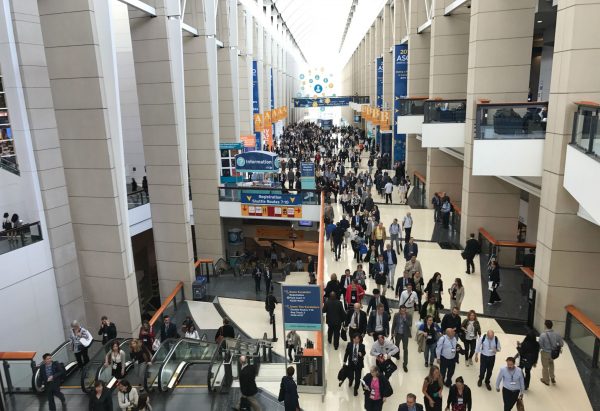
ASCO’s 2018 annual conference at McCormick Place in Chicago
A clinical trial of a CAR-T therapy for multiple myeloma recently had its protocol amended to include patients who progressed after receiving other therapies that work by targeting the same cancer cell-surface protein.
The announcement was made in a presentation of data from New York-based Bristol-Myers Squibb’s Phase I/II EVOLVE study of orvacabtagene autoleucel, or orva-cel, at the American Society of Clinical Oncology’s annual meeting. The data, which included 62 patients receiving orva-cel, showed an overall response rate of 92%, including 68% of patients who achieved at least a very good partial response. Orva-cel is distinct from idecabtagene vicleucel, the CAR-T BMS is developing with bluebird bio. The former was originally developed by Juno Therapeutics, which Celgene subsequently acquired before BMS acquired that company last year.
Data presented included patients dosed from 300 million to 600 million cells, the latter of which was determined as the recommended Phase II dose. Meanwhile, the protocol for EVOLVE was amended to include a cohort of patients at the 600 million-cell dose who had previously received therapies targeting BCMA, the antigen orva-cel targets.
Idecabtagene vicleucel also targets BCMA, as do other investigational therapies like Johnson & Johnson CAR-T JNJ-4528, its bispecific antibody teclistamab, Amgen bispecific antibodies AMG 420 and AMG 701 and GlaxoSmithKline antibody-drug conjugate balantamab mafodotin.
For the moment, that cohort divides patients into small groups based on what prior BCMA-targeting therapy they had received previously, said study presenter Dr. Sham Mailankody, a medical oncologist at Memorial Sloan Kettering Cancer Center in New York, in a phone interview. “Perhaps, depending on the data, there could be more in the future,” he said.
Mailankody estimated that the new cohort had opened a couple of months ago, but it was unclear how many patients had entered it, in part because of slow enrollment due to the Covid-19 pandemic.

A Deep-dive Into Specialty Pharma
A specialty drug is a class of prescription medications used to treat complex, chronic or rare medical conditions. Although this classification was originally intended to define the treatment of rare, also termed “orphan” diseases, affecting fewer than 200,000 people in the US, more recently, specialty drugs have emerged as the cornerstone of treatment for chronic and complex diseases such as cancer, autoimmune conditions, diabetes, hepatitis C, and HIV/AIDS.
With the CD19-targeting CAR-T therapies, particularly in acute lymphoblastic leukemia, it has sometimes been the case that a small percentage of patients who previously received therapies targeting the antigen like Amgen CD19-targeting bispecific antibody Blincyto (blinatumomab) have seen their disease lose expression of the antigen following relapse. Loss of the target antigen could make patients ineligible to receive another therapy that targets it. However, the experience with BCMA in multiple myeloma has been somewhat different.
“Fortunately, so far, BCMA-negative relapses are really uncommon, literally anecdotal, and we are not finding loss of BCMA as a cause for relapse,” said Dr. Nikhil Munshi, a professor at Harvard Medical School specializing in myeloma and CAR-T therapy, in a phone interview. “In some cases, it may get down-regulated, but it’s still there.”
Photo: Alaric DeArment, MedCity News












